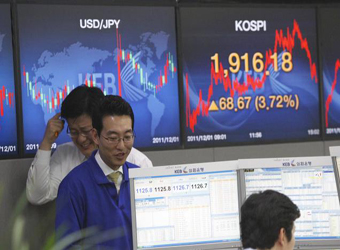Across the Korean Strait, the Kospi gained 1.13 percent after falling previously for five consecutive sessions. Brokerages, automakers and most tech stocks recorded gains: Samsung Electronics rose 2.04 percent and Hyundai Motor rose 1.84 percent.
The S&P/ASX 200 lost 0.03 percent as strength in the telecommunication services and utilities sub-indexes was offset by losses in most other sectors, including health care and gold miners.
Greater China markets were mostly higher. Hong Kong’s Hang Seng Index tacked on 0.11 percent. On the mainland, the Shanghai Composite slipped 0.11 percent while the Shenzhen Composite climbed 0.249 percent.
President Donald Trump on Wednesday broke with his party to support a package that included a short-term debt ceiling extension. If Congress passes the package, which also includes relief funding for Hurricane Harvey, it would prevent a default on the federal debt. Equities in the U.S. closed higher on the developments, with the Dow Jones industrial average edging up 0.25 percent, or 54.33 points, to close at 21,807.64.
Equities in the U.S. closed higher on the developments, with the Dow Jones industrial average edging up 0.25 percent, or 54.33 points, to close at 21,807.64.
The dollar lost some ground after strengthening against the Japanese currency on the news overnight. The greenback fetched 109.02 yen at 12:32 p.m. HK/SIN after slipping below the 109 handle briefly in early trade.
The greenback was mostly flat against a basket of currencies. The dollar index last stood at 92.192, compared to levels around 92.185 seen in the last session.
A lack of substantial developments on the Korean Peninsula also likely contributed to an improvement in risk sentiment in markets overnight, National Australia Bank FX Strategist Rodrigo Catril said in a note.
Gold prices were largely unchanged at $1,335.25 an ounce on fading risk aversion. The yellow metal had hit a one-year high of $1,344.21 on Tuesday, according to Reuters.
Ahead, markets awaited the European Central Bank’s interest rate decision expected later Thursday. While President Mario Draghi had previously remarked that the central bank’s quantitative easing program would be discussed in “the fall,” new announcements on the program could only come in October.
Besides its asset buying program, strength in the common currency could also be on the central bank’s radar after the euro climbed to a two-and-a-half year high against the dollar. The euro held firmly above the $1.19 handle ahead of the decision, trading at $1.1924 at 12:35 p.m. HK/SIN.
“We expect Draghi to strike a cautious balance between giving the first clear hints at the upcoming tapering and dovish sounds to rein in foreign exchange markets. This is a tough tightrope to walk across,” ING Asia Head of Research Rob Carnell said in a morning note.
In other central bank-related news, the Bank of Canada raised interest rates by 25 basis points on Wednesday, taking the overnight lending rate to 1 percent. The move, mostly unexpected by markets, gave the Canadian dollar a boost. The loonie traded at $1.2228 to the dollar.
In corporate news, Toshiba stock was down 1.53 percent compared to the mixed performance from other Japanese tech stocks. That came after a Reuters report that no deal was reached on the sale of the company’s memory chip business despite it reviewing an updated proposal from Western Digital.
On the energy front, oil prices slipped after rising more than 1 percent overnight as U.S. Gulf Coast refineries began resuming operations. Global benchmark Brent crude was off 0.31 percent at $54.03 a barrel and U.S. West Texas International crude shed 0.16 percent to trade at $49.08.
Energy markets were cautious of the approach of Hurricane Irma, a category 5 storm, which could potentially hit different parts of Florida. Two other tropical storms in the Atlantic, Jose and Katia, were declared hurricanes late on Wednesday.
Source: CNBC
